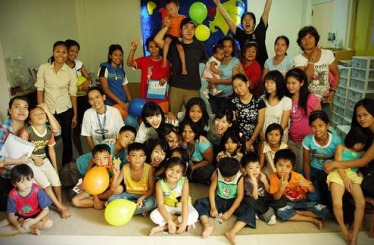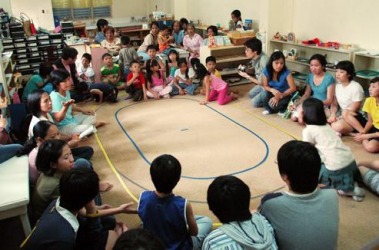KOPINO
By Jasmine Park and Yu Ah Ra Feb-22-2010

KOPINOs with Korean college students taken by KOPINOchildren association
26-year-old Filipina, Iris, has four children who all had come from different fathers but never knew and saw them even once and for the present, she is to give birth for her 5th child coming this August. She goes out for work every night near Quezon City where many foreign guys are hanging around in. She has been in this job since she was 17 years old.
This is where she got her four children and two of them are from Koreans, however, they do not know who their fathers are because all of them ran away quickly after having affairs. She once had a love with a Korean guy who she lived with for several months, but, it seems that after having a child, their love had gone bad and left her and the child alone. Her family is not really against to her situation and her job, neither does she. She said that she is most likely to get back to work again after giving birth but, for a meantime, she is in trouble for she has no source of income.
There is no exact legitimate statistics of KOPINO (Illegitimate child between Korean and Filipino) resided in the Philippines yet. According to one social research, however, approximately 3 thousand KOPINOs are staying in Quezon City area only. “This number is just official and we are assuming that unreported partial of the statistics is huge.” said Mr. Son, Beom Sik, head of ‘KOPINO Children Association’ which is the organization for KOPINOs in the Philippines.
Mr. Son has come to the Philippines to run his business eighteen years ago and got married with the Filipina and has 15 year old child. There is no proper way of naming his child because the word KOPINO generally conveys negative connotation meant for illegitimate child. He said “The ordinary Filipino-Korean couples married based on love really do not like their children to be called KOPINO; probably, there must be another word like KOPIL.” Working as a council member of Korean community, he had confronted many problems regarding KOPINOs in the Philippines. Having Filipina as a wife and ‘KOPINO’ child, he got interested to set up the community for KOPINOs and their single mothers.
After few years of conceptualization, he had decided to educate and support KOPINOs those who lack of finance and opportunities of education together with their single mothers who lack ability to support their children. He said “I see a lot of capacity in them and I am sure that they would perform as a ‘bridge’ between Korea and the Philippines if they would be educated properly.” That is why about forty children in this community must be encouraged to study and also learn Korean language and its culture as half Koreans.
According to Mr. Son, Cultural difference between the Philippines and Korea can be seen in this kind of matter that Korean women tend to have an abortion when they have unwanted pregnancy or when they think it is not the right time for their future life but most Filipinas give birth and it is much affected by the national religion, Catholic. This is why there are so many KOPINO children who don’t even know their fathers.
He has never considered his management of KOPINO community as charity business because he never thinks that KOPINO are less-fortunate just because of the fact that they are abandoned. “It is really true that most of them are facing financial problems, but I don’t see them as less-fortunate because they could have more benefits being a mixed blood in the Philippines.” Unlike Korea where people are generally conservative over mixed blood people, Philippines is more open to it due to the existence of diversified races and cultures.
Together with the ‘Korean wave’ influencing the world in different aspects especially media society like soap operas and many idol groups, KOPINOs are often seen attractive thus even though they do not know who their fathers are, born as a half Korean makes them to have some kind of ‘difference’ with other pure Filipino.

KOPINOs with Korean college students taken by KOPINOchildren association
Considering the law, the single mothers have a right to claim for the financial support from her child’s father but it is almost impossible to those who are not knowledgeable about the law and have no financial power to continue the legal proceedings.
However, in the KOPINO organization run by Mr. Son does not help for the legal proceedings for them because he considers self-support of single mother and KOPINO more important and also cares for children’s living father’s privacy. “Some might say that they deserve it but we all do not want to be happy by destroying another family, making revenge and leaving a tragedy once again”
KOPINO children association has 6 missions to fulfill which are scholarship education, Korean education system (culture and history) to have a Korean mind as well, support and providing work to be economically independent for KOPINO children and their mothers, introducing technology education of Korea business, shelter house for those KOPINO children whom can’t even raised by mothers and lastly providing place for pregnant women. Those things have been done by financial support from people generally from Korea advertised by media and others. However, it is not enough to fulfill organization’s mission yet. Mr. Son said “We are struggling to be ready for the future for gathering of possibly all KOPINOs and the mothers through the power of media.”
Starting this month, the plan of single mothers of KOPINO community, working in a small canteen located possibly near one of the universities in Manila would have a concrete proposal. Having a fixed and unsteady income, it will be the first and the great step for the community to have a better life. Iris also has decided to join the community project after a few days of being persuaded by other members of the community. According to Mr. Son, the circle of poverty line of KOPINO community would be cut off by providing support for the base of their independent business and education for the children and he sees a bright hope in the KOPINO community.
However, in the KOPINO organization run by Mr. Son does not help for the legal proceedings for them because he considers self-support of single mother and KOPINO more important and also cares for children’s living father’s privacy. “Some might say that they deserve it but we all do not want to be happy by destroying another family, making revenge and leaving a tragedy once again”
KOPINO children association has 6 missions to fulfill which are scholarship education, Korean education system (culture and history) to have a Korean mind as well, support and providing work to be economically independent for KOPINO children and their mothers, introducing technology education of Korea business, shelter house for those KOPINO children whom can’t even raised by mothers and lastly providing place for pregnant women. Those things have been done by financial support from people generally from Korea advertised by media and others. However, it is not enough to fulfill organization’s mission yet. Mr. Son said “We are struggling to be ready for the future for gathering of possibly all KOPINOs and the mothers through the power of media.”
Starting this month, the plan of single mothers of KOPINO community, working in a small canteen located possibly near one of the universities in Manila would have a concrete proposal. Having a fixed and unsteady income, it will be the first and the great step for the community to have a better life. Iris also has decided to join the community project after a few days of being persuaded by other members of the community. According to Mr. Son, the circle of poverty line of KOPINO community would be cut off by providing support for the base of their independent business and education for the children and he sees a bright hope in the KOPINO community.
